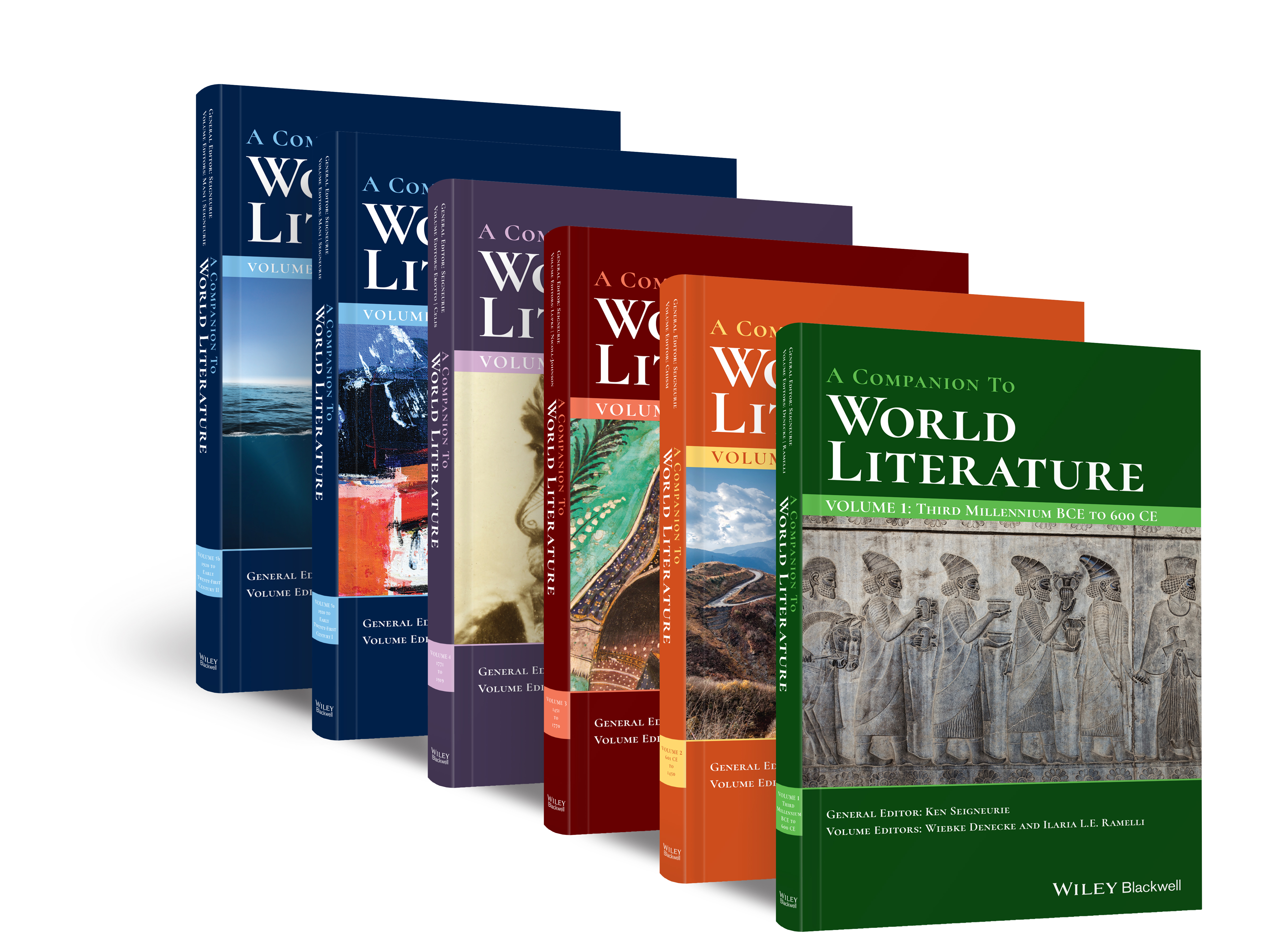Homer's Iliad and Odyssey: Poems of Many Turnings
Third Millenium BCE to 600 CE
Heroes and Heroines
First published: 19 December 2019
Abstract
The complex and varied pathways that brought Homeric epic from its beginnings on the coast of Asia Minor to worldwide appreciation involved changes of media (oral transmission to papyrus scrolls to handwritten manuscripts to printed texts and ultimately paperbacks and digital editions), empires (Athenian, Roman, Byzantine), continents, and languages. This chapter traces key stages in the journey of Homer from the eighth century bce to the twenty-first century ce, and asks what features of the Iliad and Odyssey may have prepared the poems for globally broad reception.
References
- Antonaccio, Carla. 1995. An Archaeology of Ancestors: Tomb Cult and Hero Cult in Early Greece. Lanham, MD: Rowman & Littlefield.
- Arnold, Matthew. 1903. “ The Study of Poetry.” In The Works of Matthew Arnold, vol. 4, 1–41. London: Macmillan.
- Austen, Ralph. 1999. In Search of Sunjata: The Mande Oral Epic as History, Literature and Performance. Bloomington, IN: Indiana University Press.
- Bachvarova, Mary. 2005. “The Eastern Mediterranean Epic Tradition from Bilgames and Akka to the Song of Release to Homer's Iliad.” Greek, Roman, and Byzantine Studies, 45: 131–153.
- Barchiesi, Alessandro. 2015. Homeric Effects in Vergil's Narrative. Princeton, NJ: Princeton University Press.
- Beecroft, Alexander. 2015. An Ecology of World Literature: From Antiquity to the Present Day. London: Verso.
- S. Blackburn, P. Claus, J. Flueckiger, and S. Wadley, eds. 1989. Oral Epics in India. Berkeley: University of California Press.
- Blackwell, Christopher, and Casey Dué. 2009. “ Homer and History in the Venetus A.” In Recapturing a Homeric Legacy: Images and Insights from the Venetus A Manuscript of the Iliad, edited by Casey Dué, 1–18. Cambridge, MA: Harvard University Press.
- Bolgar, R.R. 1954. The Classical Heritage and Its Beneficiaries. Cambridge: Cambridge University Press.
- Damrosch, David. 2003. What Is World Literature? Princeton, NJ: Princeton University Press.
10.1515/9780691188645 Google Scholar
- Farrell, Joseph. 2004. “ Roman Homer.” In The Cambridge Companion to Homer, edited by Robert Fowler, 254–271. Cambridge: Cambridge University Press.
10.1017/CCOL0521813026.016 Google Scholar
- Foley, John Miles. 2011. “ Oral Traditions.” In The Homer Encyclopedia, edited by Margalit Finkelberg, 607–610. Malden, MA: Wiley Blackwell.
10.1002/9781444350302.wbhe1031 Google Scholar
- Gillespie, Stuart. 2016. Shakespeare's Books: A Dictionary of Shakespeare Sources, 2nd edn. London: Bloomsbury.
- Graziosi, Barbara. 2002. Inventing Homer: The Early Reception of Epic. Cambridge: Cambridge University Press.
- Heath, Malcolm. 2011. “ Aristotle and Homer.” In The Homer Encyclopedia, edited by Margalit Finkelberg, 93–96. Malden, MA: Wiley Blackwell.
10.1002/9781444350302.wbhe0184 Google Scholar
- Hexter, Ralph. 2010. “ On First Looking into Vergil's Homer.” In A Companion to Vergil's Aeneid and Its Tradition, edited by Joseph Farrell and Michael Putnam, 26–36. Malden, MA: Wiley Blackwell.
10.1002/9781444318050.ch2 Google Scholar
- Hunter, Richard. 2004. “ Homer and Greek Literature.” In The Cambridge Companion to Homer, edited by Robert Fowler, 235–253. Cambridge: Cambridge University Press.
- Lord, Albert B. 2000. The Singer of Tales, 2nd edn. Cambridge, MA: Harvard University Press.
- Malkin, Irad. 1998. The Returns of Odysseus: Colonization and Ethnicity. Berkeley: University of California Press.
- Martin, Richard. 1989. The Language of Heroes: Speech and Performance in the Iliad. Ithaca, NY: Cornell University Press.
- Morgan, Teresa. 1999. “Literate Education in Classical Athens.” Classical Quarterly, 49: 46–61. doi: 10.1093/cq/49.1.46.
- Nagy, Gregory. 2012. Homer the Preclassic. Berkeley: University of California Press.
- Pizer, John. 2012. “ Johann Wolfgang von Goethe: Origins and Relevance of Weltliteratur.” In The Routledge Companion to World Literature, edited by Theo D'haen, David Damrosch, and Djelal Kadir, 3–1. Abingdon, UK: Routledge.
- Redfield, James. 1994. Nature and Culture in the “Iliad”: The Tragedy of Hector, 2nd edn. Durham, NC: Duke University Press.
- Reichl, Karl. 1992. Turkic Oral Epic Poetry. New York: Garland.
- Reynolds, Dwight. 1995. Heroic Poets, Poetic Heroes: The Ethnography of Performance in an Arabic Oral Epic Tradition. Ithaca, NY: Cornell University Press.
- Richardson, Nicholas. 1981. “The Contest of Homer and Hesiod and Alcidamas' Mouseion.” Classical Quarterly, 31: 1–10. doi: 10.1017/S0009838800021029.
- Schlunk, Robin. 1974. The Homeric Scholia and the Aeneid: A Study of the Influence of Ancient Homeric Literary Criticism on Vergil. Ann Arbor: University of Michigan Press.
- Simonsuuri, Kirsti. 1979. Homer's Original Genius: Eighteenth-Century Notions of the Early Greek Epic (1688–1798). Cambridge: Cambridge University Press.
- Yunis, Harvey. 2003. Written Texts and the Rise of Literate Culture in Ancient Greece. Cambridge: Cambridge University Press.
10.1017/CBO9780511497803 Google Scholar
Further Reading
- Bagordo, Andreas. 2012. “ Homer (Homerus).” In Brill's New Pauly Supplements I – Volume 5: The Reception of Classical Literature, edited by Christine Walde, in collaboration with Brigitte Egger, 154–178. Leiden: Brill.
- Clarke, H.W. 1981. Homer's Readers. Newark: University of Delaware Press.
- Gillespie, S.F. et al. 2005–. The Oxford History of Literary Translation in English. Oxford: Oxford University Press.
- Barbara Graziosi, and Emily Greenwood, eds. 2007. Homer in the Twentieth Century: Between World Literature and the Western Canon. Oxford: Oxford University Press.
10.1093/acprof:oso/9780199298266.001.0001 Google Scholar
- Hall, Edith. 2008. The Return of Ulysses: A Cultural History of Homer's “Odyssey”. Baltimore, MD: Johns Hopkins University Press.
- Kaldellis, A. 2007. Hellenism in Byzantium: The Transformations of Greek Identity and the Reception of the Classical Tradition. Cambridge: Cambridge University Press.
- King, K.C. 1987. Achilles: Paradigms of the War Hero from Homer Through the Middle Ages. Berkeley: University of California Press.



